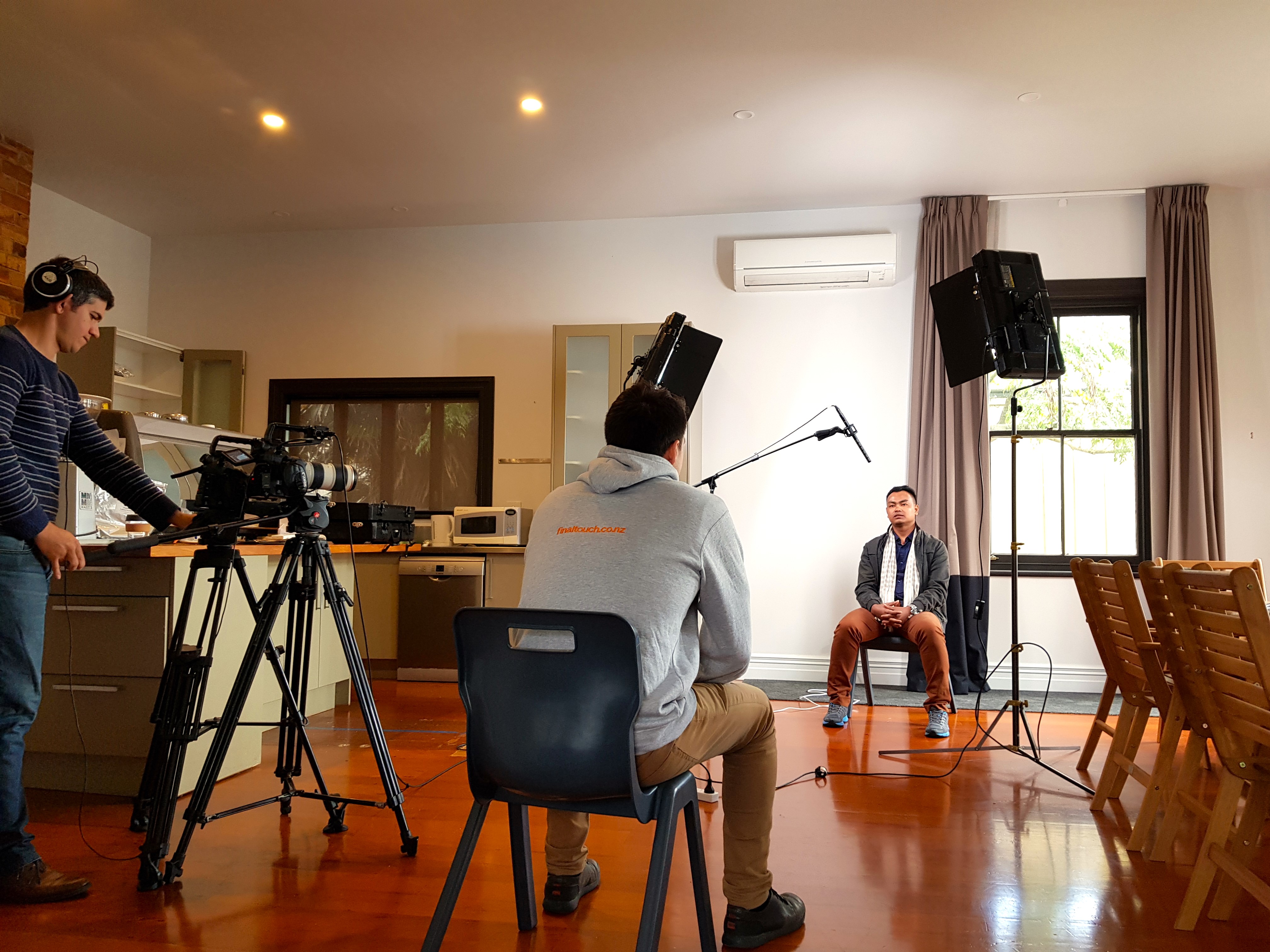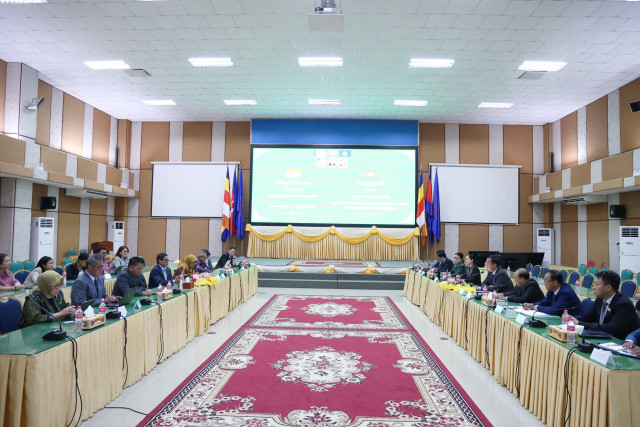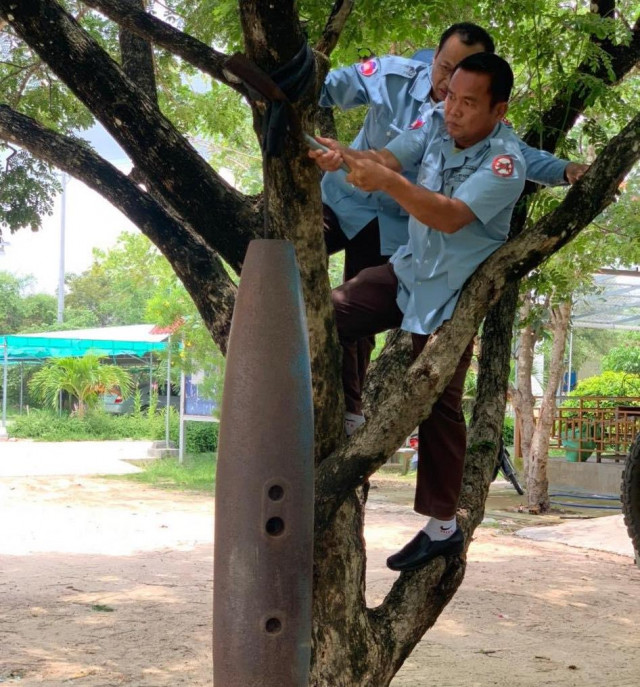Hem Kia: A Psychologist Who Never Dreamed of Becoming a Psychologist

- By Chhuon Kongieng
- November 28, 2023 5:24 PM
PHNOM PENH – Psychology was not in Hem Kia’s mind when he graduated from high school. Instead, he was looking for a university to study banking. But he ultimately chose psychology, this never-heard-of-before subject, to heal people with mental health issues affected by the Khmer Rouge.
After being involved in the field for over ten years, he now aims to contribute to the development of Cambodia’s next generation of psychologists.
Like many teenagers of his age, Kia came to Phnom Penh to pursue higher education, after spending his first years in Kempong Speu province. He chose to study psychology at the Department of Psychology at the Royal University of Phnom Penh (RUPP).
While he first wanted to commit to banking studies, he came across psychology and decided to change his plans, saying that he was very curious about what this subject could be.
“I had never heard of psychology before. I had no idea what it was for and what it was about. I don’t know why but I couldn’t get psychology out of my head, so I decided to go for it, even though that would imply giving up on banking studies and the income that goes with it,” he said.
His switch was a hard choice to make. Being the third among eight children, Kia knew that he was responsible, with his two older siblings, for the future of the family. Despite the pressure of having to engage in a major that would provide a well-paid job, he eventually went for psychology, after considering all the pros and cons.
“Because of this one reason, I know how learning psychology can help people with mental health conditions. I also realized that my parents, relatives, and other Cambodians experienced pain in life during the war, for example, during the Khmer Rouge,” he said.
“Additionally, people also have mental health problems from other things that happen in our daily lives.”
 Like many teenagers of his age, Kia came to Phnom Penh to pursue higher education, after spending his first years in Kempong Speu province. Photo provided
Like many teenagers of his age, Kia came to Phnom Penh to pursue higher education, after spending his first years in Kempong Speu province. Photo provided
Mixed reactions
Kia’s goal is to heal people with mental health issues, not only those affected by the Khmer Rouge but also people who suffer from other traumatic experiences. He wants to see their mental health improved and cured.
But there’s always a rocky way ahead.
When he first started studying this major in 2008, he received mixed reactions from people around him with some asking many questions because they didn't know about psychology. Others even had negative thoughts saying that he would have to work with insane people in the future and asking why he studied it since this major was neither common nor popular compared to others at that time.
“This shows that Cambodian people still have limited knowledge of mental health problems”, he said. “However, my friends, family, and neighbors have changed and understood after I explained to them during my visit to my hometown.”
“Despising those bad reactions, nobody denied or forced me to stop studying. Even my parents encouraged me, although we didn’t have much money. At that time, there were also some good reactions. Some people were proud of me while others said that if I studied psychology, I could see through people’s minds too,” he said.
Healing the survivors
During his studies years, he lived in a dorm and walked to university every day until he could buy a motorcycle using his earnings from his part-time job as a translator.
Kia also met a missionary who helped him achieve his dream through financial support for university and daily living expenses.
These motivated him to pursue his dream as a psychologist. He graduated with his bachelor’s degree in 2012. In the same year, he became a psychologist and started to work at Hagar Cambodia, mostly helping men and boys who survived human trafficking, sexual and labor exploitation, and violence.
Hagar Cambodia is an international NGO that works to free and heal the survivors (mainly women and children) of trauma, human trafficking, slavery, and abuse.
Kia said that not all students who study psychology choose to become professional psychologists. To ensure this, he was determined to study a psychology master's program of the arts in clinical and counseling psychology at the RUPP from 2013 to 2015.
“I tried my best, even though I worked from Monday to Friday and had to study for my master’s degree on Saturday and Sunday. Because I believe that a bachelor’s degree is not enough and it is an opportunity for me to learn, I intend to get a master’s degree to gain more credible talents,” he said.
“My goal was to become a competent psychologist who can help people with mental health problems.”
After four years at Hagar Cambodia, he was promoted and became a project manager, where he worked with clients with mental health issues and also supported other psychologists in developing their capabilities to help clients.
Between 2014 and 2015, he joined the international training with the EMDR Association Cambodiaon Eye Movement Desensitization and Reprocessing therapy, a treatment technique for mental health issues. After completing his training, he became an EMDR practitioner, and in 2019, he became a consultant or supervisor with international accreditation recognized by the UK and Europe.
“Spending 10 years at Hagar Cambodia, I learned leadership skills and also worked on the global level since Hagar International has offices in countries such as Vietnam, Afghanistan, and other countries. I learned and shared experiences with those countries about healing the mental health issues of survivors as part of the international training,” he said.
“I also went to New Zealand, and Australia, to raise funds for Hagar not only in Cambodia but also the other developing countries, promoting the campaign about our work and meeting with donors.”
Never give up
Kia emphasized that his experience with Hagar enhanced his skills as a psychologist because studying alone is not sufficient for his development.
“If I had given up, I could not be me today. So regardless of financial status, the next generation should focus on their dreams, commit to achieving them, and never give up. The importance of bravery and dreaming big can help you reach your goal.”
In 2022, Hem Kia became an advisor for Mental Health and Psychosocial Support (MHPSS) at the Civil Peace Service (CPS) of “Deutsche Gesellschaft für Internationale Zusammenarbeit” in Cambodia (GIZ Cambodia). The CPS’ work in Cambodia supports the Cambodian society towards sustainable peace and reconciliation in the context of the work of the Extraordinary Chambers in the Courts of Cambodia (ECCC) through the promotion of Khmer Rouge history education, methods of non-violent conflict transformation and the strengthening of the mental health sector. In addition, GIZ Cambodia is working in different areas such as Health/Social Security, Climate-resilient Agriculture and Sustainable Economic Development.
Kia works with the ECCC and other GIZ’s CPS partners such as TPO Cambodia (mental health care and psychosocial support for Cambodians) in the “Justice and Reconciliation in the Context of the Residual Phase of the Khmer Rouge Tribunal” project, meeting with the survivors of Khmer Rouge and help them with psychological intervention.
Kia also works with the RUPP’s Department of Psychology by providing technical support and capacity building to staff who support the students in psychology master’s level of the arts in clinical and counseling psychology”.
Additionally, he teaches mental health and psychological knowledge to third-year students from the Department of Media and Communication, who require these skills to work with survivors of the Khmer Rouge in broadcast journalism.
 As a psychologist, Kia identified two challenges in Cambodia’s psychological sector. Photo provided
As a psychologist, Kia identified two challenges in Cambodia’s psychological sector. Photo provided
Limited human resources and awareness of mental health
As a psychologist, Kia identified two challenges in Cambodia’s psychological sector. First is the limited human resources in mental health such as psychologists and second is the lack of mental health knowledge.
He said that some Cambodians are unaware of their mental health problems and are inaccessible to psychologists while some people face discrimination, afraid of others thinking they are crazy, which discourages them from seeking help despite knowing where to receive treatment.
“Being a psychologist, my achievement is just like this: first, I am very happy when my clients with mental health issues tell me that they get better, can sleep well, change their negative to positive thoughts, and want to live a better live,” he said.
“Second, I am also proud of how the other psychologists that I used to support have become stronger and more skilled psychologists.
Third, I also participated with other psychologists and experts in making a book that collaborated with the Ministry of Education, Youth, and Sport called Psychological First Aid in School (PFAS).”
Hem Kia plans to advance his knowledge in the field of mental health, aiming to contribute to the development of the next generation of psychologists in Cambodia and raise awareness about mental health among the Cambodian people.















